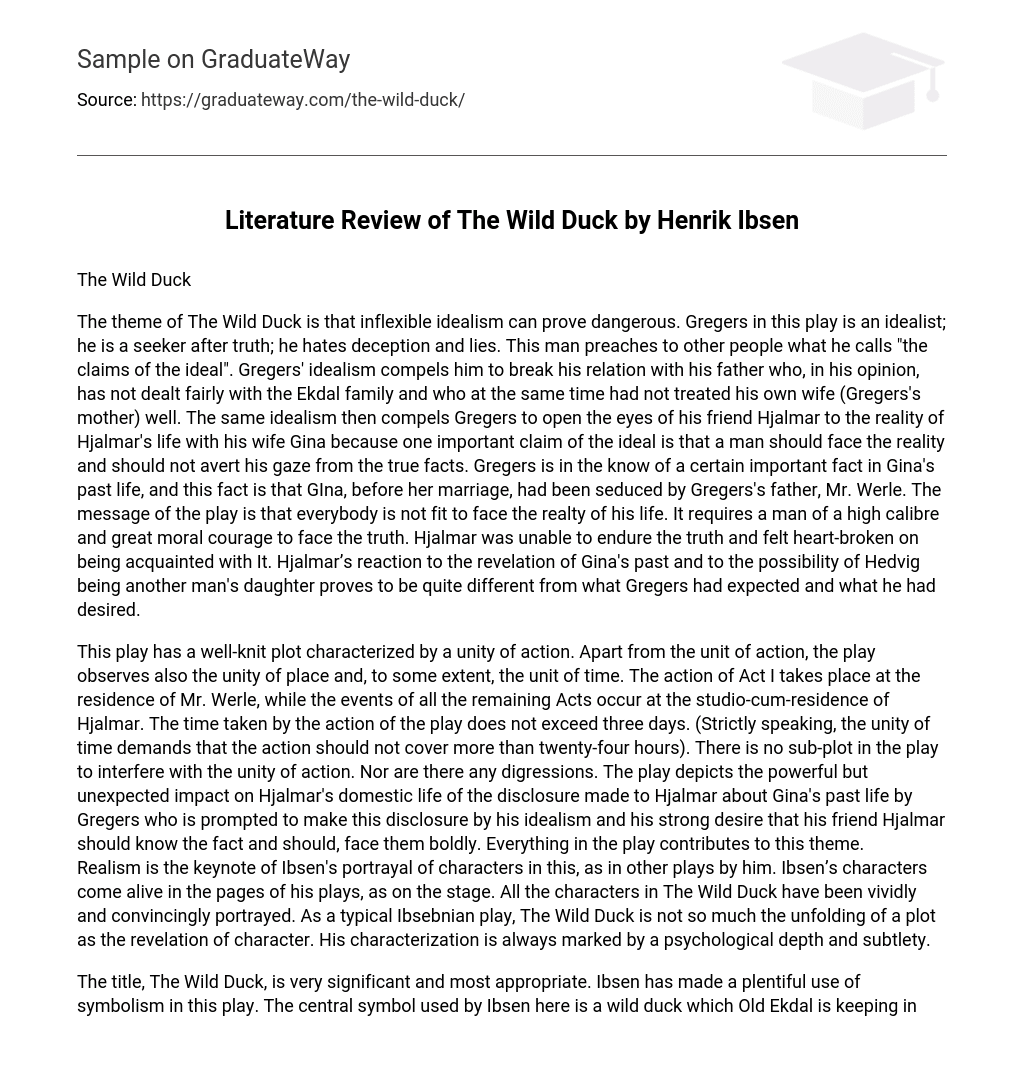The Wild Duck
The theme of The Wild Duck is that inflexible idealism can prove dangerous. Gregers in this play is an idealist; he is a seeker after truth; he hates deception and lies. This man preaches to other people what he calls “the claims of the ideal”. Gregers’ idealism compels him to break his relation with his father who, in his opinion, has not dealt fairly with the Ekdal family and who at the same time had not treated his own wife (Gregers’s mother) well. The same idealism then compels Gregers to open the eyes of his friend Hjalmar to the reality of Hjalmar’s life with his wife Gina because one important claim of the ideal is that a man should face the reality and should not avert his gaze from the true facts. Gregers is in the know of a certain important fact in Gina’s past life, and this fact is that GIna, before her marriage, had been seduced by Gregers’s father, Mr. Werle. The message of the play is that everybody is not fit to face the realty of his life. It requires a man of a high calibre and great moral courage to face the truth. Hjalmar was unable to endure the truth and felt heart-broken on being acquainted with It. Hjalmar’s reaction to the revelation of Gina’s past and to the possibility of Hedvig being another man’s daughter proves to be quite different from what Gregers had expected and what he had desired.
This play has a well-knit plot characterized by a unity of action. Apart from the unit of action, the play observes also the unity of place and, to some extent, the unit of time. The action of Act I takes place at the residence of Mr. Werle, while the events of all the remaining Acts occur at the studio-cum-residence of Hjalmar. The time taken by the action of the play does not exceed three days. (Strictly speaking, the unity of time demands that the action should not cover more than twenty-four hours). There is no sub-plot in the play to interfere with the unity of action. Nor are there any digressions. The play depicts the powerful but unexpected impact on Hjalmar’s domestic life of the disclosure made to Hjalmar about Gina’s past life by Gregers who is prompted to make this disclosure by his idealism and his strong desire that his friend Hjalmar should know the fact and should, face them boldly. Everything in the play contributes to this theme.
Realism is the keynote of Ibsen’s portrayal of characters in this, as in other plays by him. Ibsen’s characters come alive in the pages of his plays, as on the stage. All the characters in The Wild Duck have been vividly and convincingly portrayed. As a typical Ibsebnian play, The Wild Duck is not so much the unfolding of a plot as the revelation of character. His characterization is always marked by a psychological depth and subtlety.
The title, The Wild Duck, is very significant and most appropriate. Ibsen has made a plentiful use of symbolism in this play. The central symbol used by Ibsen here is a wild duck which Old Ekdal is keeping in his son’s garret along with many pigeons, hens, rabbits, etc. Old Ekdal describes to Gregers how a wild duck, when wounded, dives down to the bottom of the sea and clings to the sea-weeds there. Now, this action of the wild duck in diving to the bottom and trying to keep itself there symbolizes the tendency of most people to shut their eyes to reality and to take refuge in illusions. Apart from this central symbol, the wild duck, the garret in the Ekdal household has also a symbolic significance. A number of old Christmas trees in the garret and a multitude of small animals and birds including the wild duck there give to the garret the look of a forest in Old Ekdal’s eyes. The garret thus symbolizes the forest in which Old Ekdal used to go hunting when he was young. Now Old Ekdal occasionally shoots a pet rabbit in this garret and imagines that he has shot a wild bear. The wild duck itself does not play any part in the play, but Gregers describes it as the most important person in the garret, and he is right to a great extent. The wild duck is important as a symbol and also because it is the most dearly loved possession of Hedvig. Overall The Wild Duck is a great play that set an impetus for the social play.





